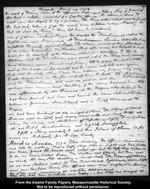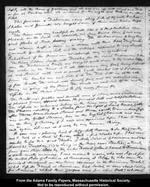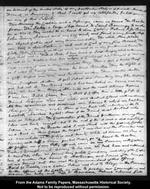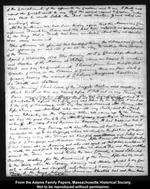Page 1
Travels
March 29. 1778.
the coast of France, some of the Officers or Passengers told a Story of Garrick. He had a relation convicted of a Capital Offence. He obtained Leave to wait upon his Majesty to beg a pardon. The King asked what was the Crime. He has only taken a Cup too much, may it please your Majesty. Is that all said the King? Then let him be pardoned.
One of Captain Tuckers Stories too diverted the Frenchmen as well as the Englishmen and Americans. A Frenchman in London Advertised an infallible Remedy against fleas. The Women as well as Men flocked to the place to purchase the Powder. But after many had bought it and paid for it, one only of the Women, asked for directions to Use it. Madam said the Frenchman, you must catch the Flea, and squeese him between your thumb and finger, till he gape, then put a little dust of this powder in his mouth, and he never will bite you again. But said the Lady when I have him between my fingers why may I not throw him in the fire or press him to death? Ali, Madam, said the Frenchman, dat will do just as well den. I should not perhaps have remembered this story, if the same had not been told me afterwards by Mr. Dumas at the Hague, who declared he had been present and seen and heard the same Sale and Dialogue between a German Mountebank and a Dutch Woman at the Hague.
We had been becalmed all day in Sight of Oleron. The Village of Saint Dennis was in Sight, and many Windmills and Sand Hills all along the Shore: and Multitudes of Vessells in Sight, French, Spanish and Dutch Merchantmen and English Smugglers.
I felt a strong curiosity to visit this Island of Oleron, so famous in Antiquity for its Sea Laws.
March 30. Monday. 1778.
This Morning the Officer came down and told the Captain that a lofty Ship was in Sight and had fired two heavy Guns. All hands were called up: but the lofty Ship appeared to be an heavy loaded Snow. The Weather was Cloudy, but there was no Wind. All very still excepting a small Suel. The Tower of Cordovan or as our Sailors called it The Bourdeaux lighthouse, was in Sight over our larbord Bow. The Officers were now employed in clearing the Ship and removing all warlike Appearances.
This day had been fortunate and happy.... Our Pilot had brought Us
Page 2
safely into the River of Garonne, and We had run up with Wind and Tide as far as Pouliac, when We anchored for the night and took in another Pilot.
This forenoon a Fisherman came along Side of Us, with Hakes, Skates and Gennetts. We bought some of them and had a high regale.
The River was very beautiful: on both sides of it, the plantations were pleasant. On the South Side especially We saw Horses, Oxen, Cows and great flocks of Sheep, feeding grazing. The Husbandmen ploughing and Women half a dozen in a drove with their hoes. The Churches, Convents, Gentlemens Seats, and the Villages appeared to me, simple Inhabitant of the American Wilderness, very magnificent.
The River seldom swells with Freshes, for the rural Improvements and even the Fishermens Houses, are brought quite down to the Waters Edge. The Water in the River is to all Appearance very foul, being saturated and stained with red or purple Earth, washed into it I suppose from the banks on each Side of it. The Tide setts in at the rate of five Knotts. The Wind was directly fair, and We outsailed every Thing in going up the River. The Lands on each Side of Us and the Vessells in the River seemed to fly away from Us.
The Buildings public and private were of Stone: and a great number of pleasant Groves, appeared between the principal Seats and best plantations. The Vessells at Anchor and sailing in the River were very numerous. The Pleasure resulting to a Novice, from the Sight of Land, Houses, Cattle, after Three tremendous Storms and three equally tremendous Chases, one in the Gulph Stream, one in the English Channell and one in the Bay of Biscay, if it was ever experienced before I hope it never will be again, delicious as it was, by any human Being.
It gave me a pleasing kind of Melancholly Reverie, to see this Country and to look at a Part of Europe,whichas a few Weeks before I had never expected to see this great Theatre of Arts, Sciences, Commerce and War.
March 31. Tuesday. 1778.
Lying in the River, near Pouliac; a twenty four Gun Ship close by Us, under French
Colours bound to Dominique. A dark misty morning. I was anxious to
enquire, who was Agent for the United States of America at Bourdeaux, at Blaye &c., who were the principal Merchants on this River, concerned in the American Trade? What
Vessells French or American had sailed, or were about sailing for America? What their Cargoes and for what Ports? Whether
Page 3
on Account of the United States, of any particular State, or of private Merchants French or American? But I could get no satisfactory Intelligence on any of these Subjects.
This Morning the Captain and a Passenger came on board The Boston from The Julie, a large Ship bound to Saint Domingo, to make Us a Visit. They invited Us on board to dine. Captain Palmes, Jesse Deane,John Quincy Adams and myself, went, and found a very pretty Ship, an elegant Cabin and every Accommodation. The white Stone plates were laid, a clean Napkin in each and a Cut of very fine Bread. The Cloth, Plates, Servants, all things were as neat as in any Gentlemans House. The first Dish was a French Soup. I had heard of Soup Meagre, which in America as well as in England had been a termWords of Contempt: but I thought if this was Soup meagre, it was a very respectable thing. Then a dish of boiled Beef, as I called it, having never heard the Word Bouillie. Then the Lights of a Calf dressed one Way and the Liver another. Then roasted Mutton. Then fricasseed Mutton. A good Sallad and something very like Asparagus, but not it. The Bread which had been baked on board was very fine. We had then Prunes, Almonds and the most delicious Raisins I ever saw; Dutch Cheese, then a Dish of Coffee, then a little glass of French Liqueur. Wine and Water and excellent Claret with our dinner. All these Appearances and provisions were luxuries to which We had been Strangers for many Weeks. None of our Hosts who entertained Us so hospitably understood English: None of Us French, except Dr. Noel who acted as Interpreter. The Conversation of the French Gentlemen among themselves was lively enough: but to the rest of Us it was a dull and silent Sc ne.... On the Quarter deck I was struck with the Capons, Cocks and Hens in their Coops the largest I ever saw and the Number was as remarkable as their Size and beauty. While at dinner We saw a Pinnace, with half a dozen genteel People, go on board the Boston. Mr. Griffin one of our Petty officers, came inourthe Pinnace, with Captain Tuckers Compliments desiring to see me. We took leave and returned to our Ship, where we found very polite Company consisting of the Captain of another Ship bound to Martinique, and several of the Kings Officers bound out. One was the Commandant of that Island.
March 31. Tuesday. 1778.
Captain Palmes was sent to Blaye, in the Pinnace, to the Officer at the Castle, in order to produce our Commission, and procure an Entry and Pass to Bourdeaux. Palmes returned full
Page 4
of the Compliments of the Officer to the Captain and to me. I shall not repeat the Compliments to me. But the earnest request to Captain Tucker was that he would salute the Fort with thirteen Guns, which was accordingly done.
All the Gentlemen We have seen to day agree that the American Commissioners Franklin, Deane and Lee, had been received in great pomp by the King, that a Treaty had been concluded. And they all expected War every moment.
This afternoon We ascended this beautiful River, the Villages and Country Seats appearing on each Side of Us all the Way, to within three Leagues of the Town.
April 1. Wednesday. 1778.
This Morning Mr. J. C. Champage, Merchant and Broker of the Marine at Blaye, came on board to make a Visit and pay his Compliments. I learned from him that of the first Grouths of Wine, in the Province of Guienne, there are four Sorts of Grapes, bearing the names of Chateau Margeaux, Hautbrion, La Fritte and Latour.
This Morning I took Leave of the Frigate Boston, and excepting a short Visit or two on board, before I satt out on my journey to Paris never saw her afterwards. She was injudiciously ordered to Charleston to defend that City, which a dozen such Ships would not have been able to effect, and was taken by the English. I went up to the City of Bourdeaux with my Son and Servant, Mr. Vernon, Mr. Jesse Deane and Dr. Noelwho were all my Suite, and Dr. Noel as an Interpreter, in the Pinnace. When We came up to the Town We had the good Luck to see Mr. McCreery and Major Fraser, on the Wharf.McCrery I had known in America. It had happened that I had ridden a long journey with him. He came on board our Boat and conducted Us up to his Lodgings, where We dined, in the fashion of the Country. Among many other Things We had fish, and [illegible] and Salad, and Claret, Champaign and Mountain Wines. After Dinner Mr. Bondfield, whom I had known also in America, and who was agent at this place, invited me to a Walk. We went first to his Lodgings where We drank Tea, and then walked around the Town and went to see the new Comedy, a most splendid Building erecting for the Amusement of the Town. After this We went to the Opera, where the Scenery, dancing and Music aforded to my Curiosity a chearful and sprightly entertainment, having never seen any Thing of the kind before. Our American Theatres had not then existed even in Contemplation.




